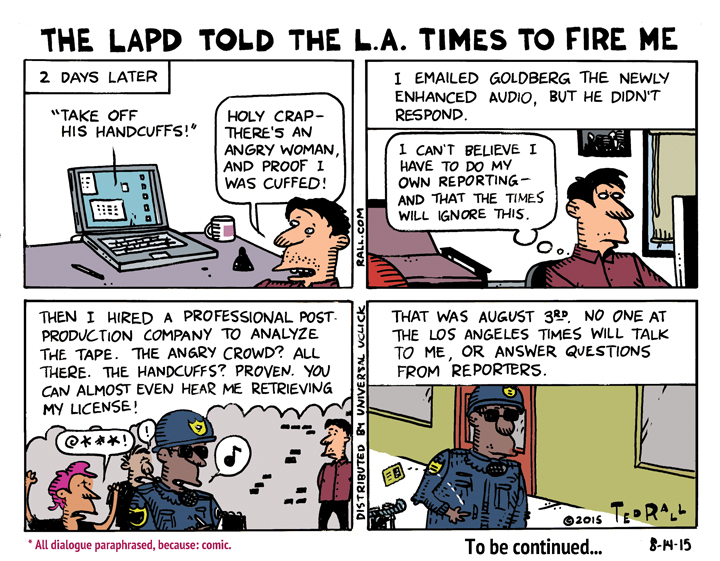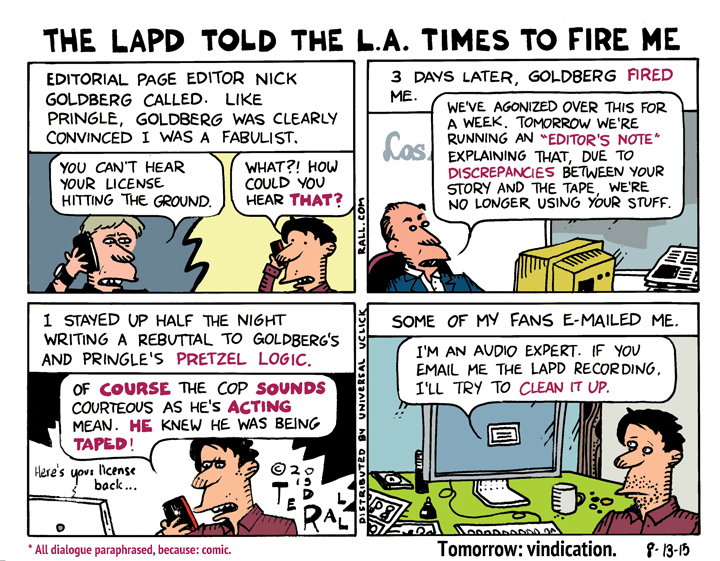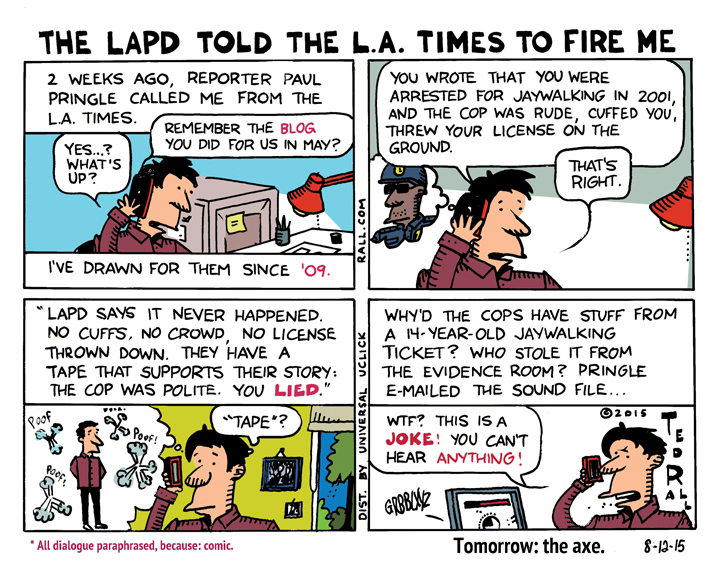
After years of no one – at least not the white people who control the media – giving a damn about what happens to black people at the hands of white cops, suddenly the terrible relationship between people and the police is a huge problem.
This is what happens when the power dynamic gets reversed, when aggressors find themselves in the unhappy role of victims. First, five policemen were assassinated in Dallas, as payback for police violence in general. Now three more have been killed in Baton Rouge, apparently to retaliate for the murder of another unarmed black man, Alton Sterling, by local police.
Cops are getting shot. So the media is finally paying attention.
Airing the issue is long overdue, but as usual it’s playing out in hackneyed catchphrases that are unlikely to lead to meaningful improvement.
What we need, liberal wise men of the media tell us, is more community policing. Cops and the community need to get to know each other. Cops should get out of the squad car, walk around, talk to the locals before they shoot them.
Conservatives have a different answer: they think people, especially black people, need to have more appreciation for the extremely hard job the police are asked to do. Except that being a cop isn’t really that hard or that dangerous. You are far more likely to die on the job if you are a logger, a pilot, a steelworker, a garbageman, a construction labor, a farmer, or president of the United States. The reason so many people join the police is that it’s actually a sweet gig: pretty well paid (especially with overtime), and you get to retire after 20 years.
Fixing people’s terrible relationship with the police who are paid to protect and serve them will require radical rather than incremental change.
(Notice that I said “people,” not “minorities.” The racial dynamic between police and minority neighborhoods that they patrol like occupied enemy territory in a war zone captures the headlines, but not the reality of a country in which many people, not just blacks, view the police with a mixture of fear and contempt. 41% of whites, for example, don’t have a high degree of confidence in the police or view them as being honest.)
Three major structural changes would go a long way towards fixing the problem.
First, the police should stop carrying guns.
In many countries, including countries where citizens have the right to bear arms, the police generally don’t carry a weapon on duty. Places like Norway, Iceland, Japan, New Zealand, Britain, and Ireland haven’t disintegrated into anarchy as a result. Nor have many policemen lost their lives. There are, of course, many reasons why disarming the police works, but there’s one that jumps to mind right away: when you get pulled over by a cop here, you know that the only way you’re going to get away clean is by shooting the police officer. Traffic stops often turn deadly. Taking guns away from the police reduces the stakes in confrontations between law enforcement and suspects. It makes everyone, including the police, safer.
If someone is robbing a bank, there’s the option of picking up some guns at the police station and waiting outside. That’s what they do in Britain.
Second, cops shouldn’t be writing tickets.
As school children, we learned that Officer Friendly is here to help us in the event that we run into trouble. In other words, the police are our guardians. But how do you reconcile that image with getting pulled over for a minor traffic infraction like a broken taillight?
If the police were really here to help us, if they were here to protect us, the policeman who tells you about your broken taillight wouldn’t write you a ticket. He certainly wouldn’t use that traffic stop as an excuse to search your vehicle for drugs or other contraband, much less steal it through “asset forfeiture.” He would tell you about the problem so that you could fix it. Period.
For the vast majority of Americans, the typical interaction with law-enforcement – indeed, their typical interaction with their government – is a police officer issuing them a parking or a traffic ticket. The role of government shakedown thug/municipal revenue enhancement is incompatible with the role of a guardian. A guardian wants you to drive safely. He doesn’t sit cleverly behind a tree at the bottom of a steep hill, where the last speed limit sign was hard to see, in order to extract a few hundred bucks from your wallet. Ask a kid who wants to be a police officer one day whether she wants to catch bad guys or write tickets. You know the answer.
At bare minimum, municipalities should create separate agencies for parking and traffic enforcement. It would be better, of course, if traffic safety had nothing to do with fines. Raise taxes on the rich if you want to replace the billions of dollars collected annually from tickets.
Third, we need a federal agency to appoint independent federal prosecutors to replace the current system of local district attorneys.
When the police are charged with wrongdoing against civilians, the odds are that they will get away with it. In fact, the odds are that they will never face an indictment. In 2015, 85% of police shootings were handled by DAs who work closely with the officer’s own department.
Which isn’t surprising considering the fact that the DA who decides whether or not charges get filed has to have a high conviction rate in order to get reelected or reappointed, which requires him or her to have a friendly relationship with law-enforcement. It’s a ridiculously brazen conflict of interest that ought to have been done away with a long time ago.
(Ted Rall is the author of “Bernie,” a biography written with the cooperation of Democratic presidential candidate Bernie Sanders. His next book, the graphic biography “Trump,” comes out July 26th and is now available for pre-order.)

 Racism is complicated. When America’s most brilliant thinkers set out to explain its nature in terms as clear as the English language allows, as Michael Eric Dyson did in his searing July 7th essay “
Racism is complicated. When America’s most brilliant thinkers set out to explain its nature in terms as clear as the English language allows, as Michael Eric Dyson did in his searing July 7th essay “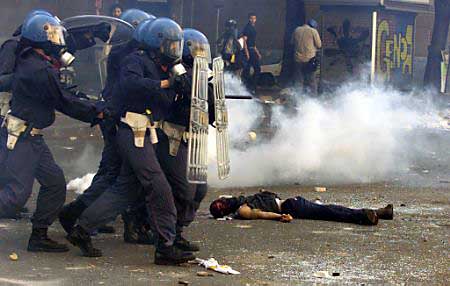
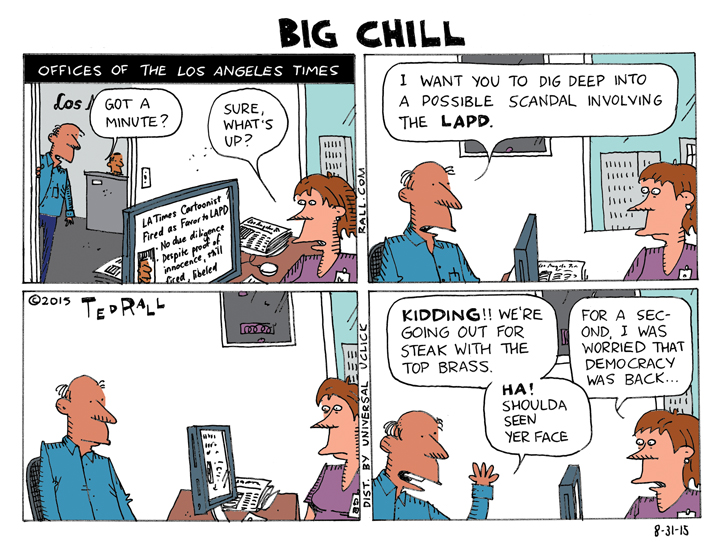

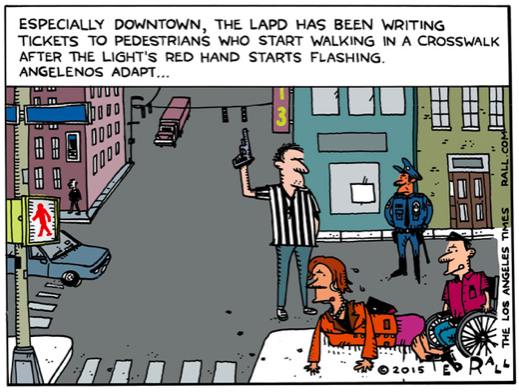 Almost two weeks ago, the LA Times fired me as their editorial cartoonist, where I’d been since 2009.
Almost two weeks ago, the LA Times fired me as their editorial cartoonist, where I’d been since 2009.